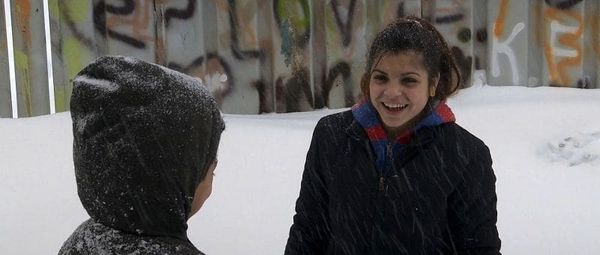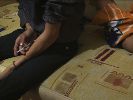Eye For Film >> Movies >> Toto And His Sisters (2014) Film Review
Toto And His Sisters
Reviewed by: Amber Wilkinson

Alexander Nanau's unflinching documentary opens a grimy window into the world of a three young siblings living - a better word might simply be existing - and more or less raising themselves in the most basic of conditions in Bucharest. If breadline poverty was not enough of a challenge for ten-year-old Totonel, Andreea, 14, and Ana, 17, they also have to contend with an older generation whose addictions and criminality conspire to make the youngsters' lives worse.
Made with the help of the think-tank Policy Center for Roma and Minorities - which works for social inclusion - Nanau doesn't hold back on the heartrending details of the children's struggle but he is a perceptive and patient director, who has clearly earned the siblings' trust and shows how their desire to do more than merely survive offers hope even in the bleakest of situations.

Circumstances could barely be more dire, with the film opening at a point where their mother, having served around half of a seven-year jail term, may be released. The kids have been living in slum chaos with their junkie uncles, Toto frequently sleeping (or pretending to sleep as a safety mechanism) on a matress amid the gear the older members of his family have used to shoot up. Despite all this, he has boundless energy and things begin to look up when a local school club offers him a chance at literacy and, perhaps more importantly for his emotional wellbeing, a level of support and an opportunity to learn hip-hop moves. His dedication to dancing is one of the driving forces of the film, as we get to watch him flourish as he prepares for competition.
The other source of light is Andreea. With elder sister Ana already on the slippery slope to addiction, it is the steely determination of the middle sibling that is holding the family together even if doing so is threatening to tear her own sanity apart. The idea of a Romanian orphanages is especially loaded for European audiences, but Nanau - while quietly illustrating the need for parental care and better societal duty to children left without them - shows an enormous change for the better since the years of the "Ceaucescu babies" in terms of care homes. Here, Andreea is offered the chance to move with Toto to a centre and the lift the pair get as a result is immense even if, as Nanau shows, happy endings are anything but a given.
The director's decision to give Andreea a camera, so that she can document her own thoughts in a video diary, serves as both an instant connection between the audience and this remarkable teenager but also, you sense, offers her a talisman to help her keep focused on what she wants. "Be strong, be stubborn," one of her teachers tells her and she takes it to heart. Nanau tells it like it is and the film's emotional moments - of which there are many - are small but powerful and unforced. His main focus is not on wallowing but observing, questioning and showing how, even the smallest of improvements, can make a world of difference to a child.
Reviewed on: 04 Mar 2015














